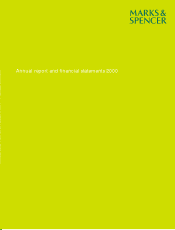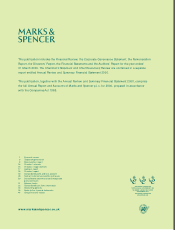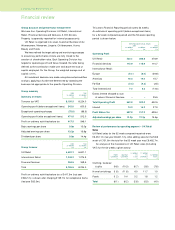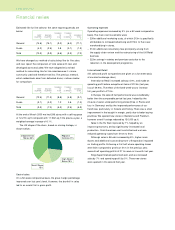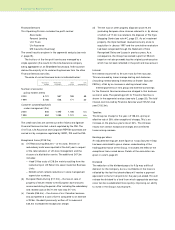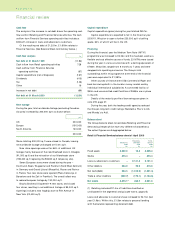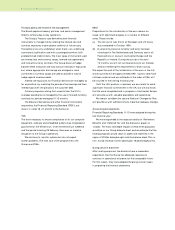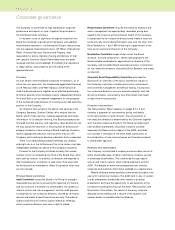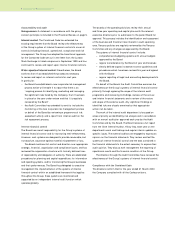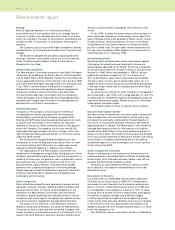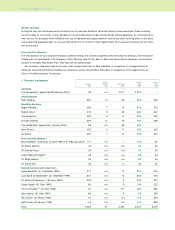Marks and Spencer 2000 Annual Report Download - page 8
Download and view the complete annual report
Please find page 8 of the 2000 Marks and Spencer annual report below. You can navigate through the pages in the report by either clicking on the pages listed below, or by using the keyword search tool below to find specific information within the annual report.
The Company is committed to high standards of corporate
governance and reports on how it applies the principles in
the Combined Code as follows.
It has been a year of significant change during which the
Board has reviewed its governance framework and updated
those matters reserved to it following the Group’s restructuring
into five separate Operating Divisions: UK Retail, International
Retail, Financial Services, Ventures and Property, each
responsible for policy, decision-making and delivery of their
own specific functions. Board Committees have also been
reviewed and their remits updated. This reflects the importance
of responsibility, accountability and risk being at the
appropriate level.
Directors
As at 31 March 2000 the Board comprises 15 directors, six of
whom are non-executive. Luc Vandevelde (appointed Chairman
on 28 February 2000) and Peter Salsbury (Chief Executive)
head the Board and work together as an effective partnership.
Sir Martin Jacomb is the Company’s senior independent director.
Sir David Sieff is not considered independent for the purposes
of the Combined Code because of his previously held executive
position in the Company.
All directors have access to the advice and services of the
Company Secretary, Graham Oakley, who ensures that the
Board, which meets monthly, receives appropriate and timely
information for its decision making, that Board procedures are
followed and that statutory and regulatory requirements are met.
He also assists the Chairman in ensuring that all directors are
properly briefed on issues arising at Board meetings. Directors
receive appropriate induction training when they join the
Company and coaching to develop individual skills as required.
There is an established procedure whereby any director,
wishing to do so in the furtherance of his or her duties, may take
independent professional advice at the Company’s expense.
Pursuant to the Company’s Articles currently the nearest
number to but not exceeding one third of the Board shall retire
each year by rotation. In practice, all directors are required to
offer themselves for re-election at least every three years and
the Articles will be amended to reflect this practice when they
are next revised.
Principal Board committees
Audit Committee: assists the Board in fulfilling its oversight
responsibilities, primarily reviewing the reporting of financial
and non-financial information to shareholders, the systems of
internal control and risk management, and the audit process.
It comprises six non-executive directors, chaired by Sir Martin
Jacomb and meets at least three times annually. The external
auditors and the chief internal auditor attend all meetings,
which executive directors also have a right to attend.
Remuneration Committee: ensures the executive directors and
senior management are appropriately rewarded, giving due
regard to the financial and commercial health of the Company.
It comprises five non-executive directors and meets at least four
times annually. Dame Stella Rimington took over the chair from
Brian Baldock on 1 July 1999 following his appointment at the
time as non-executive Chairman of the Company.
Nomination Committee: keeps under review the Board
structure, size and composition; selects and proposes to the
Board suitable candidates for appointment as directors of the
Company, and considers Board successional plans. It comprises
six non-executive directors, chaired by Brian Baldock, and meets
as required.
Corporate Social Responsibility Committee: provides the
Board with an overview of the social and ethical impact of
the Company’s activities including community involvement,
environmental management and ethical trading. It comprises
four executive directors, one non-executive director and one
divisional director, is chaired by Guy McCracken and meets
at least three times annually.
Directors’ remuneration
The Remuneration Report appears on pages 8 to 15 and
contains a statement of remuneration policy and details
of the remuneration of each director. The remuneration of
non-executive directors is determined by the Chairman together
with the other executive directors. The Board considers each
year whether shareholders should be invited to consider
separately the Remuneration Report at the AGM, and does
not consider it necessary at the 2000 AGM, particularly as
the introduction of new share schemes are themselves subject
to shareholder approval.
Relations with shareholders
The Company is committed to ongoing communication across its
entire shareholder base, whether institutional investors, private
or employee shareholders. This is achieved through regular
annual and interim reports, other trading statements and the
AGM. The website at www.marksandspencer.com contains
corporate and customer information updated on a regular basis.
Regular dialogue and presentations take place throughout the
year with institutional investors. The AGM held in July in London
is well attended by shareholders who receive a business
presentation and have the opportunity to ask questions of the
full Board including the chairs of the Audit, Remuneration and
Nomination Committees. The results of the proxy votes are
declared at the meeting and a résumé of the question and
answer session is available after the Meeting.
6Marks and Spencer p.l.c.
Corporate governance

